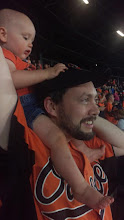Am I the only one who sees the resemblance between Bill Dillman and former O's closer Gregg Olson? Dillman's not quite as goofy looking as "the Otter", but they might pass for brothers. Unfortunately, Bill never had nearly as much major-league success as Gregg.
Bill Dillman was a Trenton, NJ native who the Orioles drafted out of Wake Forest University with their sixth-round pick in 1965, the first year of the June amateur draft. He was taken 18th in that round, one pick behind Hal McRae and one pick ahead of Sal Bando. Two years later, Bill was on Baltimore's Opening Day roster, and his big league career got off to an auspicious beginning. He debuted on April 14, 1967, working long relief against the A's after Earl Weaver yanked Tom Phoebus for walking his fourth batter to lead off the fifth inning. The rookie reliever, handed a 7-1 lead, induced a double play grounder from Danny Cater, walked Ed Charles, and then set down the final 13 Kansas City batters in order to get credit for the win. Eight days later, Earl again called on Dillman to mop up against the Athletics. Despite having a 7-2 lead, Wally Bunker had allowed 11 men to reach base in 6 innings. Once again, Bill retired the first batter he faced, allowed the second to get on base (a Bert Campaneris single), and was perfect for the rest of the game. Three innings of one-hit ball, and he had his first career save despite a 12-2 final.
In fact, Dillman reeled off 12.2 scoreless innings in his first half-dozen appearances before he proved human. On May 10, the White Sox clobbered him for 5 runs in 1.1 innings. From there, his performance was up-and-down. He won his first four decisions, including a complete-game 5-2 duke over the Twins on June 11, but lost his last six to finish at 5-9. In all, he totaled 124 innings in 32 games (15 starts) with a 4.35 ERA. Among the team's regular pitchers, only Dave McNally (4.54 in an injury-shortened season) had a higher earned run average that year.
Bill spent the entirety of the 1968 and 1969 seasons at AAA Rochester, with ERAs of 4.29 and 4.95 respectively. The Cardinals purchased his contract, but traded him to Montreal a month into the 1970 season. The Expos, still finding their footing a year after entering the league, promoted him to the majors quickly. He made 18 relief appearances for the club, and was 2-3 with a 5.28 ERA when he was demoted in mid-July. He never made it back to the big leagues, and walked away after the 1972 season at age 27. But he'll always have that six-game scoreless streak to kick off his career.
Subscribe to:
Post Comments (Atom)



2 comments:
Bsck in the day, I thought Dillman, Jim Hardin, Tom Phoebus, and Dave Leonhard were going to be another "McNally, Palmer, Bunker".
I'm sure Topps agreed with you, Jim.
Post a Comment